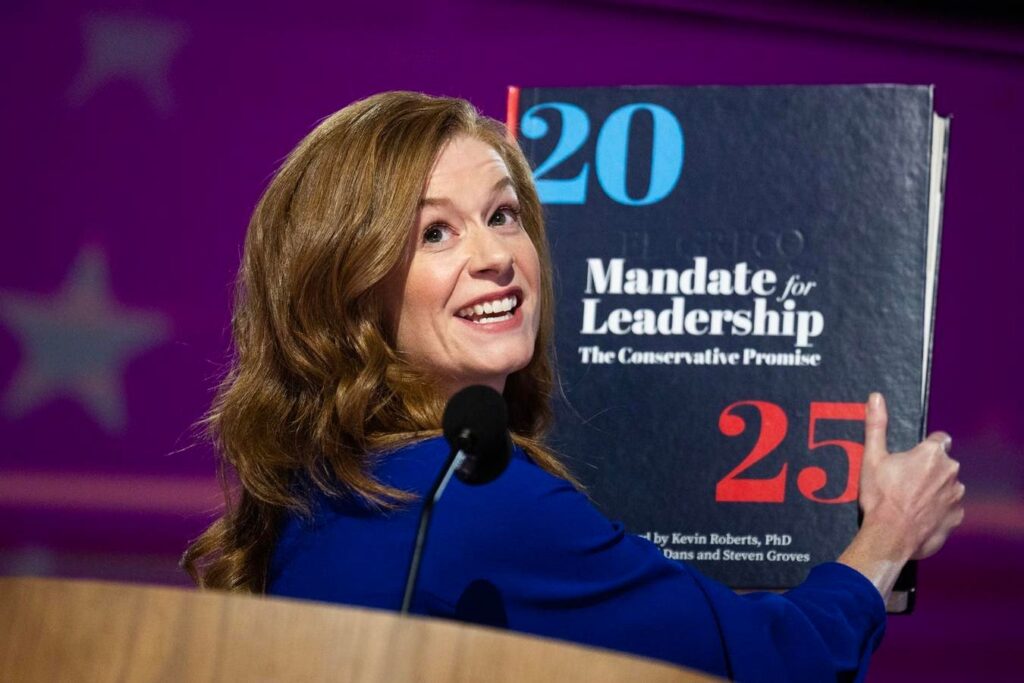The political landscape in the United States has ignited yet another controversy surrounding former President Donald Trump’s alleged connection to Project 2025, a substantial 922-page document produced by the conservative think tank Heritage Foundation. This document has drawn considerable attention, particularly during the Democratic National Convention, where figures like Michigan State Sen. Mallory McMorrow openly scrutinized its implications. Central to the discourse is whether Trump’s ideological alignment with Project 2025 underpins Democratic criticisms that he intends to execute its agenda if re-elected. However, investigations by multiple news outlets—ranging from USA Today to CNN—have refuted claims linking Trump directly to this extensive document, clarifying that it does not advocate for significant cuts to programs like Social Security, despite assertions made by key Democratic figures.
The reasons behind these political maneuvers stem from both parties’ efforts to sway undecided voters in a highly charged electoral climate. Democrats aim to leverage Project 2025 as a means to undermine Trump’s credibility, describing the agenda as potentially disastrous. However, the authenticity of these claims remains contestable, particularly when considering that those familiar with the document acknowledge that while some of its proposals align with conservative ideology, they do not inherently reflect Trump’s specific policies or intentions.
Project 2025, published in 2023, emerged from a collective of 34 authors and over 270 contributors—predominantly individuals who served in the Trump administration. The document’s foundation rests on the belief that the federal government has grown too powerful and inefficient, a sentiment resonating with a broader segment of the American public. Quality of governance and bureaucratic reform stand central to its message, with key proposals aiming to redefine various terms, including regulating the definitions of “gender” and its implications on public health data and administration.
Within the content of Project 2025 lies a controversial re-examination of subjects such as abortion and federal oversight concerning biomedical research. The document positions abortion as a matter of ethical and health considerations, advocating for research into its consequences while challenging the liberal narrative framing it as merely a health care choice. Through this perspective, Project 2025 encapsulates a conservative understanding of life ethics, aligning with traditional beliefs about the sanctity of life, while arguing for exceptions in specific, dire circumstances like maternal health and cases of assault.
Moreover, Project 2025 scrutinizes potential conflicts within federal health institutions, pointing to specific examples like the National Institute of Health (NIH) and its ties to the alcohol industry, as well as discussing its involvement with the Moderna COVID-19 vaccine. These claims reveal a broader critique concerning the influence of private industry on public institutions and funding sources, which some view as compromised by conflicting interests. Such revelations aim to highlight a systemic issue that proponents of the document argue undermines public trust and effectiveness in government-sanctioned health narratives.
While the document contains contentious points, its primary focus revolves around advocating for a streamlined, more accountable federal government. Democrats continue to allege potential repercussions of Trump’s reelection tied to Project 2025, yet many of its proposed changes resonate with enduring conservative values, implying a mischaracterization of the initiative by opponents. In the light of ongoing political discourse leading up to the elections, the dialogue surrounding Project 2025 illustrates the broader patterns of partisanship that define contemporary American politics, wherein each party seeks to galvanize their base through strategic narratives and framing around their opponents’ actions and intentions.

